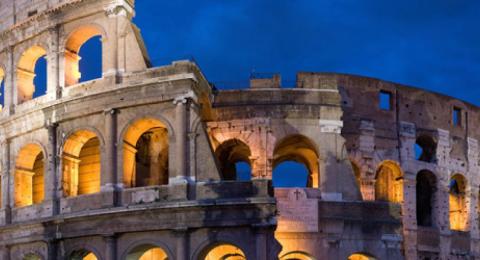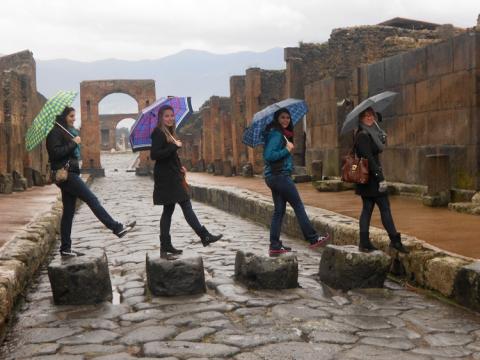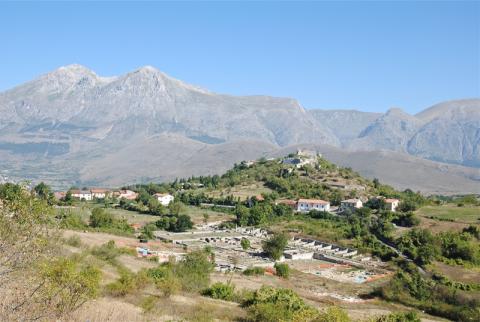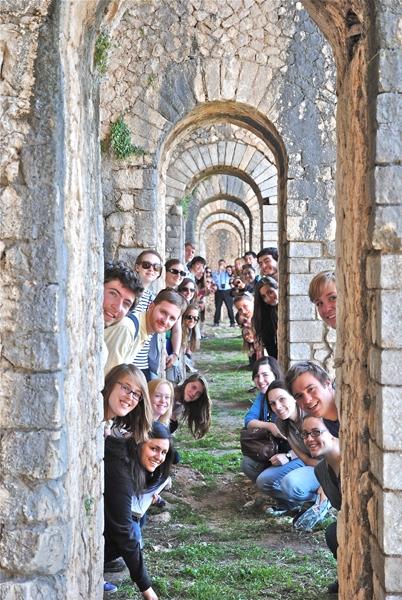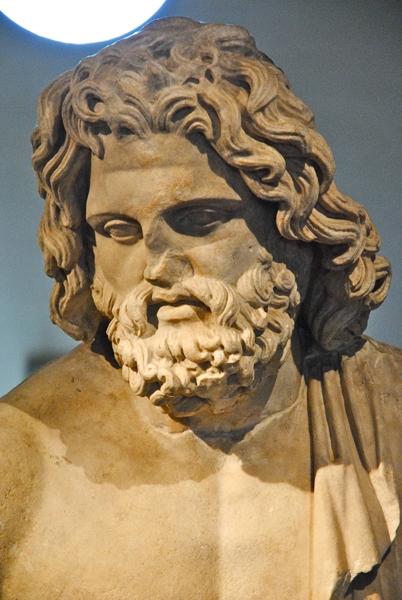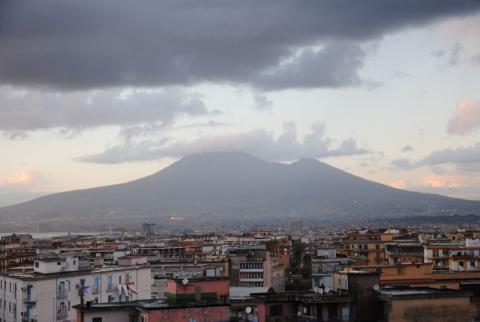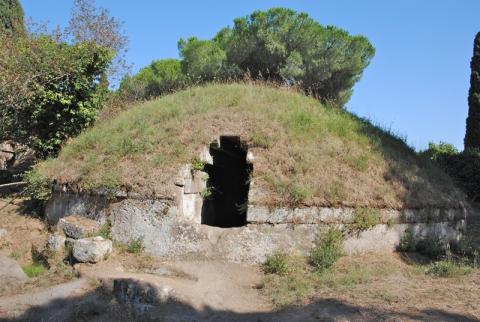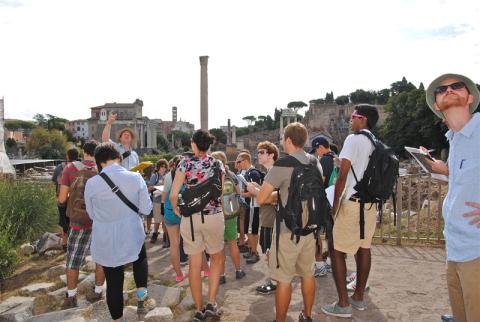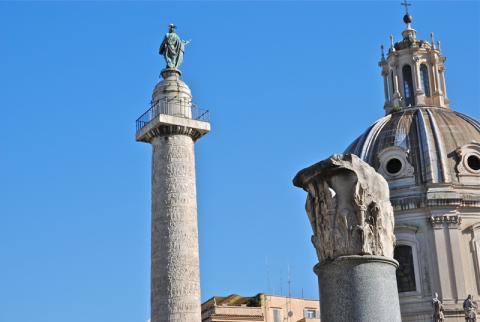The Colosseum. Photo by DAVID ILIFF License CC-BY-SA 3.0
January Term Study Abroad Program
Experience the history and beauty of Rome. Choose between a course in ancient Roman architecture and society (CLAS 510J: Building Rome, Fine & Performing Arts Discovery credit) or a course on Medieval and Modern Italy (ITAL 510J: Rome: The Eternal City in Italian culture, World Cultures Discovery credit) taught by UNH faculty in Rome. Both courses include 10 days of study in-country including two days in Pompeii. A five-day online component prepares students for the on-site portion so that they will be ready to soak in Rome’s past and present. While in Rome, students stay at the Intercollegiate Center for Classical Studies.
Apply Now! upcoming info sessions and more details
Term Offered
January Term
Application Deadline
October 1
Contacts
Ivo Van der Graaff
Associate Professor of Art History
Email: ivo.vandergraaff@unh.edu
Nicole Gercke
Senior Lecturer of Italian Studies
Email: nicole.gercke@unh.edu
Phone: (603) 862-0599
At the time of application, all students are expected to meet the following criteria.
- A minimum of 2.5 GPA at the time of application and departure
- Earned at least 12 credit hours at UNH/PSU at the baccalaureate level:
- Earned at least 32 credit hours at the time of departure:
- No disciplinary record (academic dishonesty, arrest, etc.)
Students establish eligibility with their Dean's Office via the study abroad program application process in UNH Via. If you do not meet these minimum criteria, you may be able to seek approval to participate in the program - please speak to a Global Education Advisor and your Dean's Office about any required additional steps.
The program involves intensive walking at historic sites that may feature challenging terrain or lack accessibility standards common in the United States. Contact the faculty director with any questions.
The UNH Rome Program is a short-term study abroad experience that allows a select group of to students study under the guidance of UNH faculty in Rome over the January Term. Program benefits include:
- Earn 4 credits over the J-Term
- Satisfy either the World Cultures or the Fine and Performning Arts Discovery Requirement
- Online preparation prior to departure (aka, class in pajamas!)
- Discover first-hand Rome's impressive heritage
- No language or course pre-requisites: all students with an interest in Rome and Italian culture are encouraged to apply!
- On-site lectures on Rome's greatest monuments and history by expert faculty with lots of experience abroad
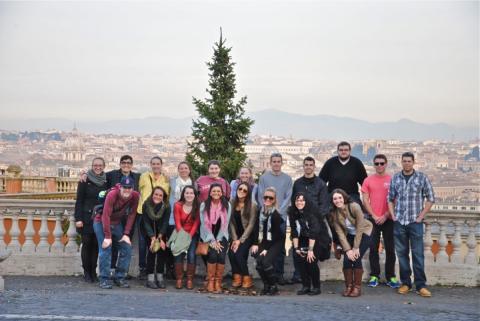
Students earn 4 UNH credits by enrolling in one of two tracks. Each course gives students an exhaustive introduction to the beauty and history of Rome, but has a unique focus.
1) Ancient Rome Track:
Experience the history, architecture and art history of the ancient Romans the way they did—in Rome itself! This course will give students a sense of the majesty and miracle that was the ancient Roman empire. Both online and on-site coursework will be conducted by a UNH Classics Studies faculty member. Students earn 4 credits and satisfy the Fine and Performning Arts Discovery Category. Below is the full course description:
CLAS 510 - Building Rome
An introduction to the buildings and structures for which the Romans remain famous, such as the Pantheon, the Colosseum, and the aqueducts that allowed Rome to become a metropolis. A major focus is the connection between the changes in Roman society and the development of Roman architecture. A week-long online component prepares students for the on-site portion, which consists of eight to ten days in the field in Rome, Herculaneum, and Pompeii, so that they will be ready to soak in the monuments of the past. In Rome, the instructor(s) will lecture at major monuments and museums, and students will be asked to perform on-site investigations. All readings are in English. No prior knowledge of the ancient world required.
2) Italian Culture Track:
Experience contemporary Rome through the lens of its richly layered history. This course will give students a sense of the important role the city’s history, and the myths and reality it has spawned, from the Popes to Mussolini to La Dolce Vita, influence the way modern Romans live their lives. Students earn 4 credits and satisfy the World Cultures Discovery Category. Below is the full course description:
ITAL 510J - Rome: The Eternal City in Italian Culture
This course is designed as an interdisciplinary introduction to the history, myth and representation of Rome from the Middle Ages to the present day. Students will have about a week-long mini course on-line, aimed at preparing them for the on-site portion, which consists of nine days in Italy. In the on-line portion of the course, students will read historical and literary texts, look at images such as paintings and maps, and watch films. On-site, the group will explore Rome’s different neighborhoods where the instructors will lecture at major monuments, churches, museums, and other important sites. Students will be asked to perform on-site investigations as well. All readings are in English. No prior knowledge of Italian language or culture required.
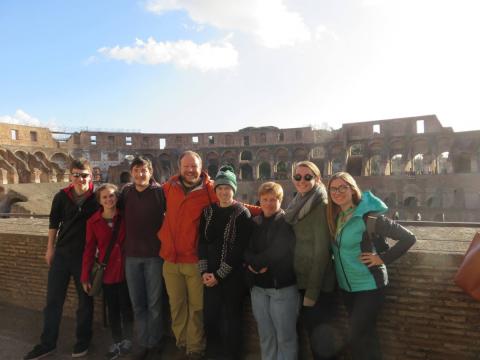
Nicknamed the "Eternal City", Rome is one of Europe's most beautiful and historically significant capitals. Its impressive history stretches back over 2500 years when a group of small settlements along the Tiber River joined together to form the foundation of what would become the Roman Republic and then Empire. The immense power and wealth of Ancient Rome transformed the city into the biggest urban center of the ancient world and left behind structures which still inspire us today. Students on the program will visit many of these iconic vestiges of Ancient Rome including the Colosseum, the Forum, and the Pantheon. But Rome is not only a city of the past. With a population of nearly 3 million, it remains one of Europe's most exciting destinations. In their free time, students can enjoy some of the world's best art museums, explore enchanting cobblestoned neigborhoods like Trastevere, camp out at a famous cafe, or seek out the city's best pizza or gelato.
Helpful Links
- Rick Steves' Europe Video: Rome's Ancient Glory
- Rick Steves' Rome Guide
- Lonely Planet: Rome
- Rome's Official Tourism Website
- Day Trip Ideas from Rome
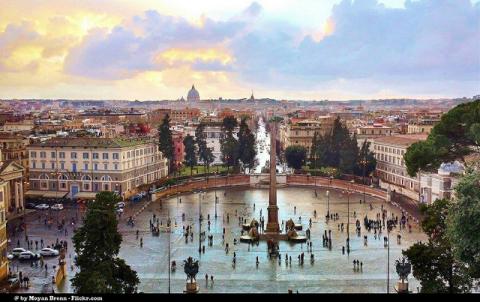
January Term tuition and course fee will cover instruction, excursions, housing, breakfasts and dinners. Students also pay a study abroad administration fee and a mandatory international health insurance fee to UNH. In addition to these fees, you will need funds for all personal and incidental expenses and travel to and from Rome, and for a few meals in Pompeii.
Refer to the "More Program Details" link above for term-specific cost information.
Housing and Meals
Students pre-pay for their housing and most meals as part of the Rome Program Fee. In Rome students will be staying at the Villa Magnolia at Via delle Fornaci 439 (00165 Rome). The facility is located in the Gianicolo Hill neighborhood, a quiet and very safe area in one of Rome's most picturesque neighborhoods. Students stay in triple or quadruple rooms. Sheets, blankets, pillows , beds, desks, lighting, and heat are provided, as are towels. Wireless internet is available throughout the facility.
With the exception of a few lunches and some dinners (so that students can take advantage of the many restaurants in the area and throughout Rome), meals will be provided by the Villa Magnolia or arranged on-site during excursions. Meals are served family-style. Program directors are available to answer any questions about logistics and host two orientation meetings to help students prepare for the program.
Other Inclusions
- Comprehensive international travel insurance and assistance program
- All program-related travel within Italy and program-related entrances.
Not Included
- Airfare to and from Rome
- Some weekend meals
- Italian phone plan (required)
- Personal spending and travel expenses
